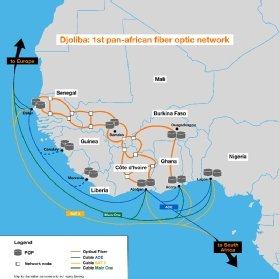
Porcupen/stock.adobe.com
Orange strengthens West African connectivity with first regional network
Global telco and subsidiaries commission and make commercial launch of the first pan-African backbone covering eight major countries in the region
In a move it says supports the digital ecosystem and meets the growing needs for connectivity in West Africa, network operator Orange has announced Djoliba, the region’s first unified superfast broadband network providing “seamless” connectivity, with better availability, network redundancy and security, and “excellent” quality of service.
The Djoliba infrastructure is based on a terrestrial fibre-optic network, coupled with undersea cables, offering secure connectivity abroad from West Africa. The new backbone covers eight countries: Burkina Faso, Côte d’Ivoire, Ghana, Guinea, Liberia, Mali, Nigeria and Senegal. Natively interconnected with each country’s domestic network, this broad coverage will generalise access to connectivity for operators and companies. Orange said it is operated and maintained from Dakar to give greater efficiency, responsiveness and proximity, and has a dedicated supervision centre.
Explaining the rationale for the launch of the network, Orange said that telecoms networks in West Africa have previously been built inside each country. There was no cross-border network, so to provide a service between two capitals, operators had to integrate the services of several providers and join different networks, which were interconnected at the borders. By contrast, Orange said the Djoliba network was a “true innovation” that simplified the interconnection between countries.
In addition, the operator said Djoliba would be the first network in West Africa to offer complete security, with more than 10,000km of terrestrial fibre-optic network coupled with 10,000km of undersea cables, superfast broadband provision (up to 100Gbps) and 99.99% availability.
The network covers 16 points of presence, with a grid of nearly 155 technical sites, and connects 300 points of presence in Europe, America and Asia. It is based on Orange’s Tier 1 network and has seamless connection to the operator’s international networks.
In addition, Orange assured that by using the Djoliba network’s superfast broadband transmission, customers would be able to access Orange platforms and benefit from its services in Africa. These include IP transit, mobile service platforms, hosting in Orange datacentres in Africa and virtual private networks (VPNs).

Orange said Djoliba would meet the needs of companies and telecoms players in West Africa, representing a key factor of future internet growth for a potential 330 million inhabitants in the region, promoting fair access to digital technology between West African countries and helping to stimulate the countries’ digital economy.
Orange is currently present in 18 African countries where it has more than 120 million customers. The operator said it would continue its investment on the continent to offer reliable, secure and high-quality connectivity and contribute to the population’s digital inclusion.
“Orange is actively contributing to the development of undersea and terrestrial infrastructure which enable the African continent’s digital transformation, by investing €1bn each year,” remarked Orange Middle East and Africa CEO Alioune Ndiaye.
“With Djoliba, local populations will be able to access healthcare or educational services more easily, as well as the applications offered by cloud computing. Development of access to digital technology is a key challenge for Africa and I would like to congratulate our teams in all the countries for their remarkable work that has enabled the Djoliba project to come to fruition.”
Read more about networks in Africa
- MainOne West African submarine cable implements Infinera to boost spectrum capacity and optimise performance on undersea cable serving as West African backbone network for Orange’s international connectivity in Africa.
- Iron Mountain scales global connectivity collaboration with Telia Carrier for enhanced global network covering African region aiming to deliver increased high-performance network diversity for datacentre customers.
- Global consortium launches 2Africa ‘transformative’ subsea cable connecting 23 countries in Africa, the Middle East and Europe.









